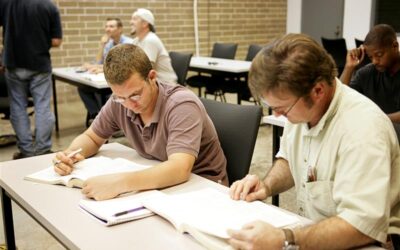By Kevin Roberts
We mentioned in a previous article that the test taker should not focus on the test but on the questions.
This is a narrow application of a much broader principle. When a person focuses on an idea, or a goal, or a target, it is at least normal, and perhaps unavoidable to have your focus expand. Allow me to explain.
Ever play tennis? There is a 1974 book titled, “The Inner Game of Tennis” by Timothy Gallwey. Now, I haven’t played tennis since before this book was written, and couldn’t describe the rules, but this is a fascinating book on human nature and ability. The author describes how he was able to help struggling tennis amateurs properly focus by distracting their focus. Yes, you read that correctly.
Let me mention another book. “Thinking Fast and Slow” by Daniel Kahneman. I suspect you may have heard of this one. In this book, for which Kahneman won the Nobel Prize in Economics, he describes System One and System Two thinking.
System One is subconscious, habitual, and effortless. System Two is conscious, calculating, and arduous.
If you stop and think about this, it is easy to recognize the times in which you used one or the other. Ever get off the elevator on the wrong floor? That is System One. Need to multiply 236 times 357? That needs System Two.
It takes System Two to monitor the progress of the elevator to get off at the correct floor. System One drives you home from work while engaged in other thoughts or listening to a podcast. System Two remembers to stop on the way home to get milk.
The tennis book describes the same principle but precedes Thinking Fast and Slow by decades (and reverses the One and Two terminology).
In a physical skill like hitting a tennis ball, you must practice enough to develop muscle memory. This allows System One to hit the ball without thinking about it. Actually, you need to hit the ball without thinking about it. If you allow System Two to think about hitting the ball, you are overthinking. Gallwey trained people to distract System Two with a detail about the ball so that it would not get in the way of System One.
One example he gives is of a middle-aged woman who lost her ability to make contact with the ball in the center of the racket. In his first session with her, he asked her to not focus on hitting the ball, but to simply try to see the seams. He then served her 10 volleys, and she hit nine of them dead center on the racket. What she had been previously doing was allowing System Two to take over a task for which it is not equipped to handle. She needed System One to hit the ball because the task is too complex for System Two to do in the time allotted. You see, muscle memory (part of System One) is not a metaphor, it is a reality. A similar thing may happen to you if you are batting with two outs in the bottom of the ninth inning with the game on the line. You can hit the ball any day of the week and twice on Sunday unless you let System Two overthink it. If you do, you fail.
A similar thing can happen when you are writing up a labor description. You may have used a word thousands of times, but this time it just looks like you spelled it wrong even though you didn’t. That, dear reader, is System Two getting in the way.
This is not to say that System One is good and System Two is bad. No, they are just different, and you should be grateful for both.
When you’re driving home, System One allows you to think about other things.
When you are driving in an unfamiliar neighborhood, System Two allows you to avoid wrong turns.
How does all this apply to test questions?
If you are a reasonably educated tech but struggle with testing, you may be allowing System Two to mess with your System One skills: word recognition for example. Here is what may happen. You have worried about the test for weeks. You walk into the test venue. You realize the importance of passing the test. You look at the size of the test. You fill out your name and the other needed entries and your mind starts to swirl. The words seem to lose meaning, which makes you question yourself and why you are even here. Sound familiar? If this describes you in any way, this article is meant for you.
Let’s go back to practice questions.
We will assume that your practice takes place in a location with little or no pressure. At home, at your work desk, on your phone in the park.
Step One:
- Forget what is on the line with the test. It is easier to do so now (which is why we practice).
- Read the words.
Step Two:
- Label the words.
- Find the noun/subject of the sentence.
- Find the verb/action word of the sentence. (With test questions it is commonly “is”).
- Recognize what other words/phrases contribute to the meaning of the question.
What you are doing is distracting System Two from the importance of the test, the responsibility you have for your children, and the difficulty of trying to get every question correct.
Once you start doing this, you will find that the important part of the practice question is NOT the question, or even the answer, it is the practice. As you progress, you may even find that knowing the answer is secondary. It is in training your mind to narrowly focus on the key words that will allow you to prevent overthinking.
Ever heard a marksman say, “Aim small, miss small?” It is a similar principle. By focusing on a tiny detail, you can avoid missing the main target.
Now for the punch line.
You practice, practice, and practice some more with practice questions. What you are doing is using System Two (calculated, intentional, and with effort) to train System One (habitual, subconscious, effortless) to recognize what the question is saying. You are teaching yourself to read. Once you have overcome your fear of questions in practice, you can let System One do its magic by reading the question once and choosing the first answer that seems correct. Will this give you a perfect score? Likely not because System One is not perfect. But properly trained, it has a higher likelihood of choosing the correct answer. Especially if you are among the group that finds your mind swirling around the question should you hesitate to follow your first instinct.
Try it.
- The Anatomy of a Test Question, Part 1
- The Anatomy of a Test Question, Part 2
- The Anatomy of a Test Question, Part 3






